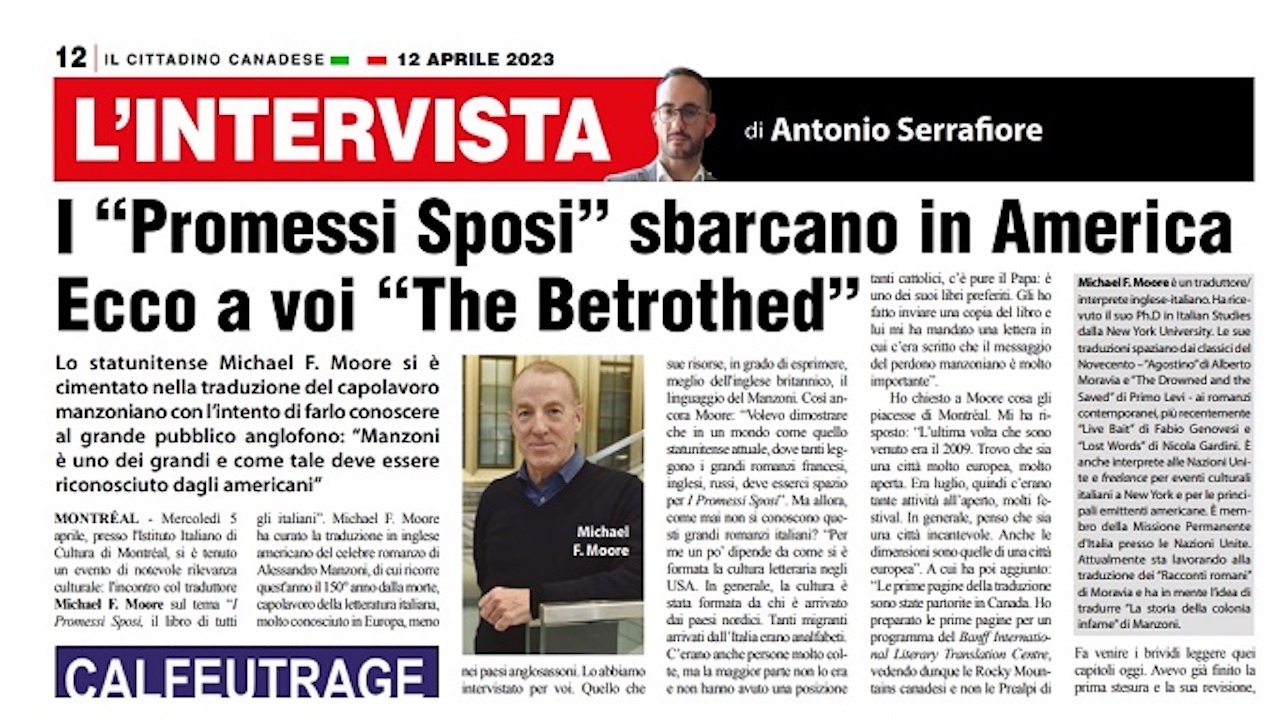MONTRÉAL\ aise\ – “Wednesday, April 5, atItalian Cultural Institute of MontrealAn event of considerable cultural significance took place: the meeting with the interpreter Michael F. Moore In the title “Engagement, the book of all Italians”. The American English translation of Alessandro Manzoni’s famous novel by Michael F. Edited by Moore, this year marks the 150th anniversary of his death, a masterpiece of Italian literature, well known in Europe, little known in Anglo-Saxon countries. We interviewed him for you. It was to interview Moore Anthony Serapiore “Canadian citizen”, edited weekly by Vittorio Giordano in Montreal.
“What struck me was Moore’s deep love for Italy and Italian culture.
“It’s a passion project. Out of love for the Italian language and for the English language, I regret that this novel is unknown. Scholars give speeches about why I Promessi Sposi is not known in Italy, and they talk about the Italian content. On the other hand, I believe that the earlier translations are not good, They do not add to the feeling and beauty of the work. As Parthes said, the pleasure of the text is missing. I wanted to give this pleasure to the novel and to the English-speaking reader”.
Moore told me that he wanted to use “his” American language as a language, just as Manzoni used the contemporary language of his era.
“A beautiful language, a glorious vernacular in its own way” – the American language – on which he wanted to use all his resources, capable of expressing Manzoni’s language better than British English”. So Moore again: “In a world like the present U.S., French, English And I wanted to prove that in a world where many people read Russian novels, there should be room for engagement”.
But how come we don’t know these great Italian novels?
“To me, it depends on how literary culture developed in America. In general, the culture was developed by people who came from the Nordic countries. Many immigrants from Italy were illiterate. There were highly educated people, but not many and they did not have a dominant position in the culture. The Germans and the French dominated American culture for decades. played a role. I wanted Manzoni to be included among the greats. This is the task I set for myself: Manzoni is one of the greats, and he should be recognized by Americans. For me, the main problem is the same. The previous translations were true, but they lacked the basic features of the work: the beauty of the language, the fluidity, Paradox. Lack of vitality! I was able to give this vitality and I am very happy with it”.
“(…) This is a book to be loved, to be read, to be enjoyed; Avid readers should start adding Manzoni to their libraries along with Tolstoy, Flaubert, Dickens. For Italy, we can say it is a kind of justification for its culture and its language. Among the enthusiasts are many Catholics, even the Pope: this is one of his favorite books. I asked him to send me a copy of the book and he sent me a letter saying that Manzoni’s apologetic message was very important.
I asked Moore what he likes about Montreal. He replied: “The last time I came was in 2009. It’s a very European city, very open. It was July, so there were a lot of outdoor activities, a lot of festivals. All in all, I think it’s a beautiful city. Even the dimensions are the dimensions of a European city”.
To which he added: “The first pages of translation were born in Canada. I prepared the first pages for the Banff International Literary Translation Center’s program, so that the Canadian Rockies and Como are not pre-Alps. Having lived in Milan, Como and Bellagio, I saw the same landscapes as Manzoni and translated the rest. I must say that there are pages of Manzoni that are like paintings. He manages to describe landscapes perfectly with words.
Moore then points out how the timeliness of Manzoni’s masterpiece can be seen in its ability to convey timeless situations and feelings. So that’s your answer to my question about Manzoni’s description of the plague of the 1600s – a period in which all the events he describes are linked – to the period of epidemics just experienced and the similarities to the current war. Between Russia and Ukraine: “They are not parallels, I would go further. It is similar to what we have experienced. Manzoni’s observations on human nature are very current. I find him a very intelligent and witty writer. It is scary to read those chapters today. I have already finished the first draft and its revision, But when covid broke out, I thought back to the moment when Renzo returned to Milan. He sees the man who wants to ask for directions, while the others are scared and shout, “Go, get away from me.” I could feel on my skin what he wrote in the 1800s. Those episodes are current. “I like to re-examine a similar situation that I experienced to make sure that the situation is better described. And Manzoni points out how little we as human beings have learned from past experiences”.
Michael F. Moore was truly a good man, as well as a great man of culture. I can only join his voice in inviting you to read The Engagement of Alessandro Manzoni. For English speakers, I recommend reading the novel’s 650 pages in its American translation, “The Betrothed,” for accuracy. (ice)

“Total coffee junkie. Tv ninja. Unapologetic problem solver. Beer expert.”


